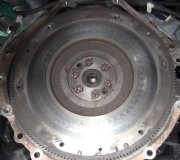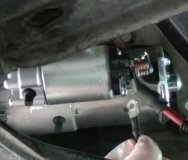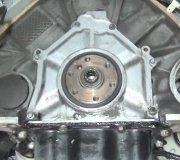If you suspect an issue with the flywheel or the teeth on it causing a high whine and intermittent starting problems in your 2000 Nissan Maxima, there are a few steps you can take to check for signs of damage:
Visual Inspection: You can start by inspecting the flywheel and its teeth visually. To do this, you'll need to remove the starter motor, which is typically located near the bottom of the engine where it connects to the transmission. Look at the flywheel teeth for any signs of wear, chipping, or damage. A damaged flywheel tooth could cause the starter to engage improperly, leading to the high whine and difficulty starting.
Manual Rotation: With the starter removed, you can try manually rotating the engine using a wrench or socket on the crankshaft pulley. Rotate the engine in the direction of normal rotation and feel for any abnormalities or resistance as you turn it. If you notice any rough spots or difficulties turning the engine, it could indicate a problem with the flywheel.
Starter Inspection: While the starter is removed, it's a good idea to have it tested at an auto parts store or a mechanic shop. They can perform a bench test to check the starter's performance and determine if it's working correctly.
Listen for Unusual Noises: When trying to start the car, listen carefully for any unusual noises, especially when the engine doesn't engage correctly. A damaged flywheel or starter gear teeth can produce distinct sounds.
If you find clear signs of damage on the flywheel teeth or if the starter fails the bench test, it may be necessary to replace either or both components. The cost of the repair will depend on the labor rates in your area and whether you choose new or refurbished parts. Replacing a flywheel can be a more involved and labor-intensive process compared to replacing a starter, so it may be more expensive.
Saturday, July 22nd, 2023 AT 12:40 PM



